#Ardamírë
Explore tagged Tumblr posts
Text
THE EUROPA CLIPPER LAUNCHED THIS MORNING, AND I AM SO NOT NORMAL ABOUT IT!!!!!
Space is so fucking awesome. We're headed to one of JUPITER'S MOONS!
Every time a launch happens, it makes the latent space enthusiast in the back of my brain jump up and down. It also derailed all my plans for today. I did have plans.
Instead, someone made one comment about how I could now maybe make mission patches on my embroidery machine, and the space thing crossed over with my current hyperfixation (silm) to produce THIS:
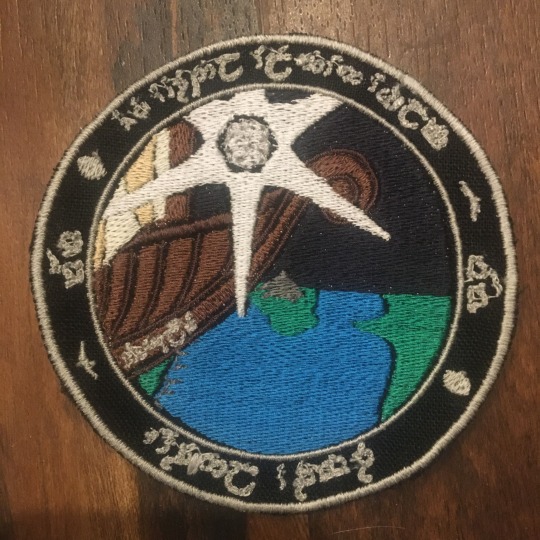
Mission patch for the launch of Gil-Estel! A bit messy, but a good place to start!
Design and linguistics details under the cut, because I put WAY too much thought into it and now must talk SOMEONE's ear off about it. Feel free to ignore this bit:
So, to start: Elvish NASA. I chose to call them Vardildi Elengolmo Vilciryamoyë, or VEV. The Followers of Varda, Astronomers and Astronauts. This could very much be totally wrong. Vardildi is Varda+the suffix used in Yavannildi, the followers of Yavanna. Elengolmo comes from the coined word for astronomer, Elengolmë (star-lore), with the -o suffix from nolmo, wise person. Vilciryamoyë takes the vil- from the root of vilya, meaning air, sky. ciryamo is mariner, and yë is the suffix added to the second word meaning 'and'. (I may be very, VERY wrong on this! If anyone has better ideas, I very much welcome input/guidance/constructive criticism)
So I stuck the tengwar for this on either side of the patch. (None of the tengwar is all that legible, though, I'm working on getting that sorted out) Most NASA mission patches don't actually have NASA on them, but I put it on anyway. Here is the tengwar and the start of a logo I made an attempt at (the tehta is supposed to be a shooting star, but that did NOT come through clearly in the embroidery [because it's tiny]):
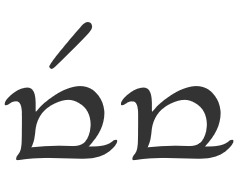

(Probably going to try to make an elvish NASA patch before too long, honestly)
Most NASA patches (from research I did with great self-restraint here) have the (last) names of the astronauts. Not sure if they also have the name of the craft or if that's generally somewhere else, but I put both--Eärendil Ardamírë (his fathername and mothername) are the tengwar at the bottom of the patch, and Vingilotë is written on the keel of the ship. None of these are legible because they are small, and my machine has limits. It's a work in progress. Also I apologize for the bad lighting in the photo.
NASA patches sometimes also have a mission motto. That's the tengwar across the top of the patch here-- aiya Eärendil elenion ancalima, Hail Eärendil, brightest of stars (a common cry among elves and Frodo [when facing Shelob]).
(I half wanted to do something a bit more funny--maybe something like 'Now I have become Venus,' or 'Do I get to come down?' but this was a bit easier since it comes pre-translated into Quenya and tengwar, and also I have no faith in my Quenya translations that are any longer than a word)
The horizon is flat because Númenor exists, in the middle there between the shore of Middle-Earth and a teensy bit of Valinor and the Enchanted Isles.
The design for the Silmaril is sort of taken from the heraldic device Tolkien designed for the Silmarilli (though it isn't clear), and it is rayed with the six-pointed star from Eärendil's device. (I stuck the moon phases from the same source around the edges as well)
This was really fun, even if it might be the silliest thing I've ever made! It definitely needs some workshopping--i don't mind the black lines framing some sections from the background fabric, but I might try turning all the tengwar into lines of stitches instead-the satin columns really are illegible.
I now need to restrain myself from doing some sort of NASA/Astronaut Earendil AU, because it now sounds kind of fun (I do not have the background knowledge for this)
Sources:
NASA patches here: https://www.shopnasa.com/collections/patches
Quenya translations here: https://www.elfdict.com/
Tengwar transcriptions here: https://www.tecendil.com/
And if you want info on the Europa Clipper mission, here: https://science.nasa.gov/mission/europa-clipper
Embroidery digitization done with Embrilliance Stitchartist 1, embroidery done with a Brother SE630 machine. Thread is Brothread Cotton and YLI cotton bobbin thread, with a little sulky rayon on the Silmaril. Cloth is a black linen from Fabric Wholesale Direct.
#earendil#silmarillion#space is cool#machine embroidery#pityahano#craft#surprisingly pleased with how this turned out#since it was less 'trace this colored pencil drawing by Tolkien'#and more 'what does a ship look like in 3000 stitches or less'#space#astronaut earendil#vev-elvish nasa#lord of the rings#silmaril
270 notes
·
View notes
Text
Today (technically yesterday) has been the inauguration of the true holiday frenzy. I'm soothing myself with a random Tolkien poll (obviously skewed by my tastes):
If you only want to choose one of the people in a mother-son pair (whether mother or son), BZZZZZT don't vote for that one. Your vote goes to both mother and son.
#deliberately excluded some obvious heavy hitters like míriel-fëanor or dís-fíli (or kíli) or lúthien-dior#anghraine babbles#poll nonsense#legendarium blogging#more tags tomorrow it's been far too long a day to remember them all correctly
134 notes
·
View notes
Text
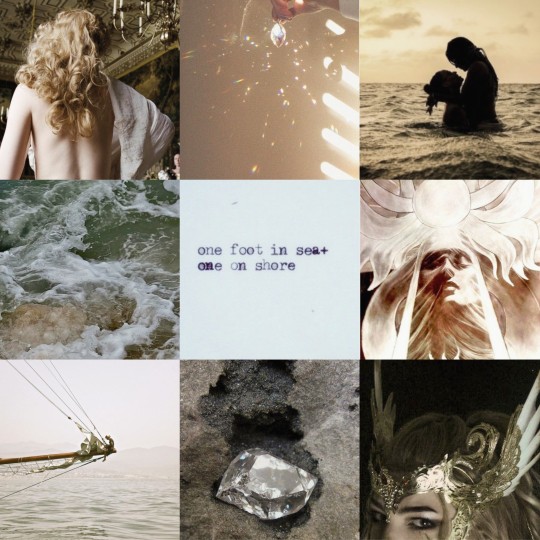
Ëarendil Ardamírë the Mariner
#thats it for the house of fingolfin!#ill make elrond and elros at some point im sure#this one is my favorite hands down#earendil#silmarillion#silmarillion edit#silmarillion moodboard#my edit#i didnt realize he had a mother name but i think its beautiful
50 notes
·
View notes
Text
this is a really interesting take, because while I agree that making Elwing a total victim of her situation isn't great her situation still isn't perfect - and if she loves her people and her people genuinely care for her and she us genuinely doing the best she can then it just makes the whole thing more bittersweet? I guess? I'm sorry for kinda going off on one. I do like slightly tragic Elwing tho so I love this tale - yellow-faerie
The Gondolidhrim see Earendil as their child-prince-miracle even when he's grown. He's their lord on a technicality, but the older Gondolidhrim, who are used to spoiling him, and can't quite grasp the way he ages anyway, do the actual administration. So he can spend all his life at sea on a divine mission - they'll let him and only say how he resembles his ancestors.
Elwing on the other hand is seen by her people as a queen, and an almost god-like one because of her lineage. She loves the people who saved and raised her, and she's proud of her father and grandmother and her mother as well, but she is young and lonely and doesn't know herself. So it gets a bit too much, sometimes, bearing the weight of her family's survival and of Doriath's memory as well as the weight of her own heavy heart. She wishes she could do what Earendil does sometimes. To run away to the sea that sings to her and loose herself between the salt and the wind and the waves. But the heirloom she wears around her neck is a constant reminder of her legacy, and Elwing is a conciencious woman.
60 notes
·
View notes
Text

Eärendil - by Alystraea Art
"Éalá Éarendel, engla beorhtast, ofer middangeard monnum sended" "Hail Éarendel, brightest of angels, above the middle-earth sent unto men." We owe so much to Anglo-Saxon poet Cynewulf. In 1913, Tolkien read this line from his poem, fell in love with the name Éarendel, got the idea of Middle-Earth, and the rest is history. So it all began with Eärendil.... also known as Gil-Estel the Star of High Hope, Ardamírë the Jewel of the World, the Splendour of the Children of the Earth, the Bright Star of Morning and Eventide, the Herald of the Morning.
7 notes
·
View notes
Photo
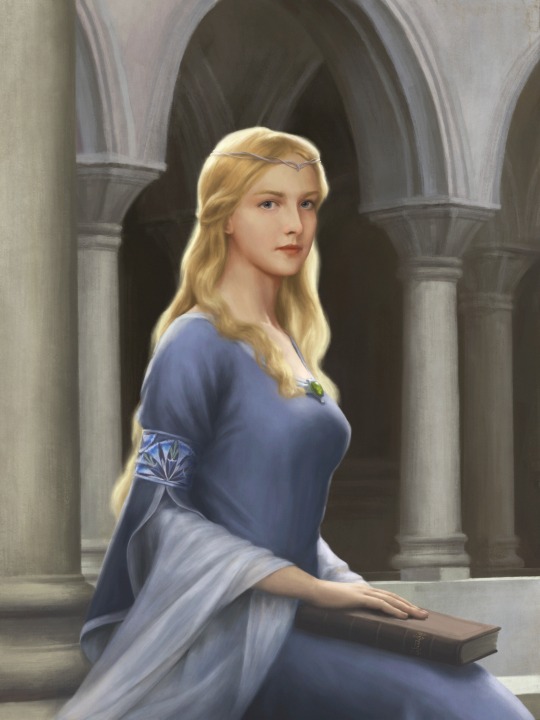
Idril wearing the Elessar
"But fairer than all the wonders of Gondolin was Idril, Turgon's daughter, she that was called Celebrindal, the Silver-foot, whose hair was as the gold of Laurelin before the coming of Melkor." - Silmarillion
845 notes
·
View notes
Text
barrier breaking silmarils
All this time spent questioning the Valar’s choice to refuse all ships from Beleriand except the one with the Silmaril only to come to the realisation it is a non-issue because the Valar never actually decided to make an exception to let Eärendil and Elwing through.
Vingilot makes it through across the Great Sea where the other ships fail because the Silmaril disrupts the barrier fencing Vailnor allowing them passage, just as it disrupted the Girdle of Melian from Carcharoth’s stomach to enable the werewolf to penetrate Doriath. Maybe it’s fate these things happened, as fate let Beren slip into the forest of Neldoreth, but the Ainur had nothing to do with it.
That is the reason there was no one waiting to meet Vingilot at the shore, why there was nobody waiting in Tirion and Eönwë only appeared after Eärendil had searched the city. Nobody knew they were coming (except perhaps Ulmo and Vairë).
And so the Valar relent not because they have been bribed with a Silmaril but because Eärendil succeeds in pleading the case of the peoples of Beleriand to them, not in prayers that maybe only a single Ainu will hear, but to the collective council of the Aratar with the Vanyar, Falmari and Ñoldor gathered for the festival there to hear all.
The Vanyar, who have spent centuries chilling in the bliss of Aman, hearing about the shit Morgoth and pals have been up to (◡‿◡✿) (ʘ‿ʘ✿) (ʘ‿ʘ)/✿ ✿\(。-_-。)
#Tolkien Legendarium#silmarillion meta#silmarilli#Eärendil Ardamírë#the Valar#the Fencing of Valinor#the Doom of Mandos#a wild headcanon appeared
10 notes
·
View notes
Text
Just noticed there is an Adunaic name of Earendil……so if you put the three name of this mariner together, it will be Eärendil Ardamírë Azrubêl, and the meaning will be like “the one that devoted to the Sea became the Jewel of the World, and made of the Sea”

94 notes
·
View notes
Text
There were not many Calaquendi left in Beleriand: the light of the Trees in an elf’s eyes was uncommon enough to draw looks. The wars of Beleriand had been unkind to the great exiled hosts of Fingolfin and Fëanor. Here in Sirion, most of the Eldar were Avari, or of mixed race born on these shores to sun and starlight.
The light in the the child-queen’s eyes was not of the Trees. It was at once more dim and more fey. Dior’s daughter had Sindar-dark eyes, not Noldor-grey, but Idril recognized their brilliance as a cousin to her own.
None could look on that lost light and come away unchanged.
“So it is true: you have kept the Silmaril of Lúthien,” Idril said.
Elwing drew out the chain around her neck. The great gem was swathed in dark fabric to shade it, but light still crept through the weave in pinpricks. “I have kept it,” agreed Dior’s daughter, “for it is my grandparents’ prize and my own birthright, and I shall surrender it to none.”
A shadow passed over Idril’s heart, for she knew the prophecy spoken by her law-father Huor to her father Turgon on the field of Tears. With the clear eyes of death Huor had foretold of a new star from their joined lines, a prophecy borne out in their grandson. Ardamírë, Idril had named her son, with the foresight of a mother. The world’s jewel. What it meant yet she could not say.
A star, a gem, a slice of hope. Perhaps some good could be had of this jewel that had already provoked another Kinslaying.
“I think you are right!” Idril told the young queen after examining her closely. “You shall not surrender it unwillingly, but neither shall you be its bearer forever. It is a curious puzzle!”
Elwing regarded Idril. Her eyes were large and dark. It was the expression of a child who was unsure of what she saw and thus found silence the easier answer.
“Come,” said Idril, offering up her hand. Perhaps it was unseemly and yet Idril could not stop herself. Elwing took it anyway. “I have a son I would like you to meet. He is of an age with you, and I hope that you shall be friends.”
#my post#my writing#tolkien#silmarillion#idril#elwing#i tried to mimic Tolkien’s style a little more consciously here and i hope it worked!
65 notes
·
View notes
Text
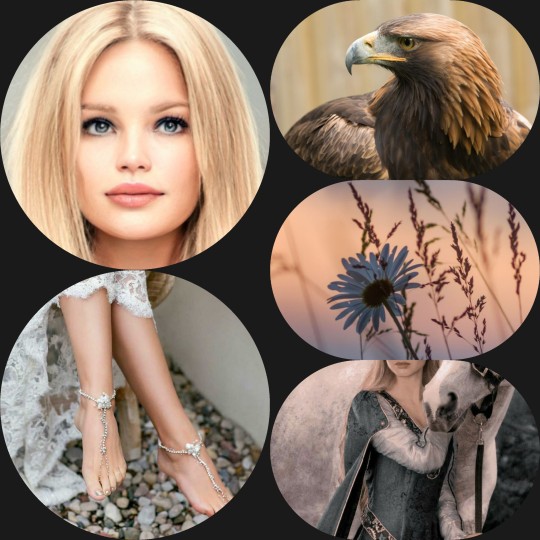
Idril Celebrindal
For @finweanladiesweek coming up on Sept 19th.
"But fairer than all the wonders of Gondolin was Idril, Turgon's daughter, she that was called Celebrindal, the Silver-foot, whose hair was as the gold of Laurelin before the coming of Melkor."― Quenta Silmarillion, "Of the Noldor in Beleriand"
Idril Celebrindal was the daughter of King Turgon of Gondolin, the wife of Tuor and the mother of Eärendil the Mariner.
Idril Celebrindal was the only child of Turgon. She participated in the Flight of the Noldor, and had to cross the Helcaraxë with the host of Fingolfin. She and her mother Elenwë fell into the bitter waters, and Turgon risked his life to save them. But he could only save Idril.
Idril lived in Vinyamar during the beginning of the First Age, and she moved with her father and their people to the Hidden City of Gondolin between the years 64 and 116.
In the hidden city the Smith Enerdhil crafted the gem Elessar and gave it to Idril, who wore it upon her breast.
Maeglin, the son of Aredhel, Turgon's sister, became interested in Idril even before coming to the city, and when he saw her for the first time "she seemed to him as the sun from which all the King's hall drew its light." She was the only one who could pierce into his mind, and knowing his thought of her she loved him the less, as they were too closely related.
When Tuor son of Huor was received in Gondolin, the heart of Idril was turned to Tuor, and his to her. Because Turgon had grown to love Tuor as a son (as he had his father before), and remembering the last words of Huor, he allowed Idril and Tuor to wed, thus bringing about the second union of Elves and Men, after Beren and Lúthien. From them Eärendil Half-elven was born, and she gave him the mother-name Ardamírë, that foretold his destiny.
Years later, Morgoth had increased his effords to find the city, "but Idril Celebrindal was wise and farseeing, and her heart misgave her, and foreboding crept upon her spirit as a cloud." Therefore, Idril let prepare a secret way, and she contrived that this work was not known to Maeglin. Thus, when the Fall of Gondolin began, she and Tuor were able to lead many survivors out of the city and save their lives.
After the fall of Gondolin, Idril and Tuor became leaders of the exiles at the Havens of Sirion, where they also received Elwing, daughter of Dior, son of Beren and Lúthien.
When Tuor grew old, he departed in his ship Eärrámë for the West, and Idril went with him. Before leaving, she gave the Elessar to her son, saying: "The Elessar I leave with thee, for there are grievous hurts to Middle-earth which thou maybe shalt heal." It is believed by the Elves and Dúnedain that Idril and Tuor arrived in Valinor, and it is said that Tuor became reckoned in the kindred of the Elves, so that they both lived in Valinor.
The Sindarin name Idril is not glossed, but the form of her Quenya name Itarillë (or Itarildë) means "Sparkling Brilliance".
She was called Celebrindal ("Silver-foot"), because she always went barefoot,from celeb ("silver") + tâl ("foot").
Idril's portrait created using Artbreeder.
30 notes
·
View notes
Text
Elrond and Love
Love has always been a dagger in the back for Elrond.
For love, of sea and duty and family, Eärendil Ardamírë leaves his wife and twin sons behind forever. He manages to, eventually, accomplish his goal; he gains his wife, but he loses his children in the process.
One, he may meet thousands of years later. Another, not until Arda is remade, and maybe not even then.
The sword stained with the blood of his people is pulled from from Elrond's gut of Elrond's child-heart and offered hilt first. Gradually, Elrond will learn to grab for not the sword, but the hands which offered it, and he will love them, those permanently red-stained hands, against all thought and logic. Though he will offer that it was logical, too, to love them as well as hate them.
That is alright, he will think, because he has experience already with mingled love and hate.
The sword becomes a knife thrust into his back the moment the hands he has learned to love so very much push him away for his safety (for love of him) and then years later draws blood once more, of red (again) and not black.
Love is a dagger to the back, is a pronouncement of abandonment. Elrond has learned this lesson twice by the end of the War of Wrath, and the gong of fateful dread pounding in his heart when he and his brother are called to appear before the Herald of Manwë informs him he will have at least a third lesson to really let it sink in.
His brother, his twin, the only other on these shores that shares the unique blend of three kindreds, has chosen to cleave to a Fate opposite him. Elros may tarry awhile on this shore, and Elrond might even be able to visit his kingdom after it is established on the new, bright star-shaped island, but Elros will leave him behind. Utterly.
It is well, then, that the dagger which Elros so steadily wields is not shove into Elrond'd back, but into his heart, fast-forward. It does not make the wound hurt any less for all that he sees it coming, but there is an honesty to it which Elrond will, in time, learn to appreciate.
When Celebrían, his beautiful, silver-queen wife, is brought back to him scarred, marred, and broken, he nearly expects the leaving of her too. He fights against it, of course. He has ever fought against Fate, it seems.
But when she sails he can at least allow for a bit of hope. Hope that she will be well, in time. Hope that the knife which has serrated his heart so as to make it consciously bleed will eventually come out and he can heal as well.
Arwen's Choice is not so much a knife or a dagger but a sword and spear. It cuts him deeply, pierces him throughly. Where once, he might have been able to resist boarding a ship for a time despite the greater loss of Vilya's Power entangled with his Fëa, he cannot wait long at all.
That Elladan and Elrohír choose to remain behind—for a time, they say—merely deepens the fatal blows.
His children's Choices were meant to be made when he Sailed. He does not know, cannot hope, what it means that his twin sons have not explicitly stated their Choice and will not Sail with him.
The father in him is both thankful and mournful that they stay behind, in part, to watch over their younger sister. The wounded boy over six-thousdand years old counts it as yet another lesson, yet another blade which cuts deeply.
Love is a dagger to the back, a knife to the throat, a sword in the gut. Love is a blade that cuts and pierces and stabs.
Love is a blessing and a curse, and Elrond has known all his loves to be both.
71 notes
·
View notes
Photo


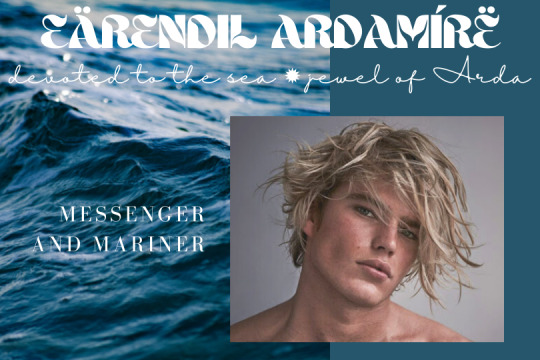
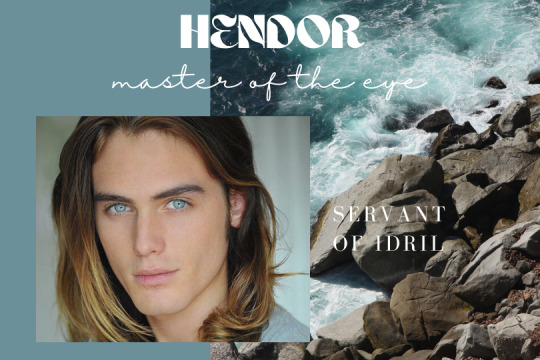
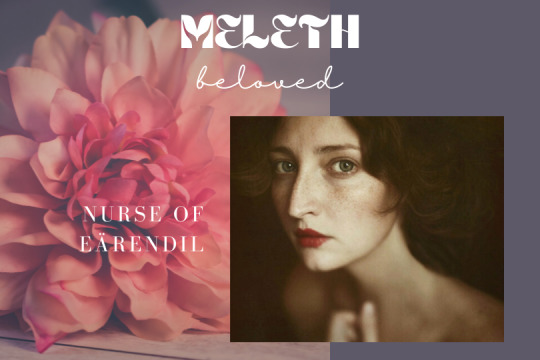
elves of arda ✹ gondolindrim ✹ headcanon disclaimer ✹ @gondolinweek
Itarillë Vanisailë was the daughter of Turukáno Ñolofinwion and Elenwë Calimiel. She was only a child when the Ñoldor marched across the Helcaraxë, a treacherous journey where she lost her mother. Her father, always a serious nér, grew even grimmer after this tragedy and kept Itarillë close to his side. The arrival of the Noldor in Beleriand allowed for Itarillë to exercise slightly more freedom than she had been allowed on the Ice, though Turukáno still would not allow her to wander far. As she grew into adulthood, Itarillë loved and resented her father in equal measure, for he was the only parent she retained and yet denied her the agency she craved. Itarillë went with Turukáno to Nevrast, and while she loved the sea she missed the company of those few friends who had not quailed from her father’s intimidating presence, including the young healer Meleth who charmed her to distraction. She missed also her uncle Findekáno, a gay and jovial prince who indulged her more rebellious tendencies and shielded her from Turukáno’s anxiety. Itarillë grew restless in Vinyamar, chafing against her father’s stern watch, and eventually fled secretly to visit her uncle in Dor-lómin (and Meleth, who served in his house) without Turukáno’s leave. Turukáno lost his temper dramatically when he discovered her flight, an incident that resulted in his close friend and cousin Finrod taking him away on a journey to come to terms with his fears and losses. Turukáno was gone for a year, during which time Itarillë finally felt she could breathe and discover what kind of nís she wanted to be. Finrod arranged for her cousins Orodreth and Tyelperinquar to keep her company while Fingon, Galadriel, and Aredhel kept watch over the band of youths; the cousins engaged in many lighthearted adventures and dramatics, including teasing Orodreth over his infatuation with the Sindarin princess Amathluin, daughter of the rulers of the Mithrim Sindar. Itarillë and Meleth flirted for several months, exchanging a few kisses and love letters before they decided that they were not fated to bond, settling instead into a deep and abiding friendship that would stand the test of time. When Finrod and Turukáno returned, the distance between father and daughter had mellowed their tempers, and they were reunited with gladness. As Itarillë, or Idril as she became known in Sindarin, came of age, Turukáno gradually relaxed his vigilance over her safety and grew to confide in her of his plans to build a city safe from the dangers of Beleriand. Idril proved an invaluable counselor as he began work on Ondolindë’s construction, and Turukáno proved his trust in her by granting her a noble House of her own once they retreated into the city’s walls. In the safety of Tumladen, Idril reassumed her Quenya name, and was known both as the Princess of Ondolindë and the Lady of the House of the Wing. She took this symbol from the swans she had loved in Vinyamar, having learned their language from her kinswoman Galadriel, originally of the Teleri of Alqualondë. Among the folk of the Wing were Itarillë’s friend Meleth and her house-carl Hendor, a footman she had befriended during her year in Fingon’s court. Itarillë was a skilled dancer, both as a solo performer and with her friend Meleth as a partner, and for this and her habit of walking about the streets of Ondolindë unshod, she earned the epessë Telpevontál, or Celebrindal. She was for the most part removed from the politics of her father’s court, for she held more interest in dancing and tending to the palace gardens than quarrelling with her fellow lords. Nonetheless, when she held an opinion on King Turukáno’s policies, she was certain to make her voice known, and all respected her input. Though Itarillë was not herself a hunter, she would sometimes accompany her aunt Aredhel, Lady of the Tower of Snow, on expeditions outside the city limits. She still yearned for freedom, and though the confinement within the white stone walls of Ondolindë was less stifling for her than it was for her aunt she wished to breathe the open air and have space to herself from time to time. When Aredhel left Gondolin to visit Fingon in Dor-lómin, Itarillë half-wished to accompany her, but she knew her place was at her father’s side. Upon Aredhel’s disappearance and her later death, Itarillë was deeply grieved, for she had loved her aunt dearly. Though Aredhel perished, her son lived, though Itarillë knew not what to make of Maeglin Lómion, the cousin she never expected to have. His apparent apathy upon the execution of his father unsettled her, and though she was naturally sympathetic to a young ellon so cruelly orphaned his oddness made her hesitate to befriend him. It helped not at all that he seemed to shy away from her, even as he grew more confident in his position as the King’s nephew and revealed a more charming and charismatic side to the people of Gondolin. Penlod, the Lairde of both the Pillar and the Tower of Snow after Aredhel’s demise, would still at times invite Itarillë to accompany them on hunts outside of Ondolindë. On one such occasion, Penlod also extended the invitation to Maeglin, and he eagerly accepted the chance to see some of the outside world. While on this ill-fated expedition, the hunters were attacked by white wolves from the mountains, and Itarillë and Lómion were separated from the rest of the group. Lómion suffered a great injury in defending Itarillë from the wolves, and Itarillë, who had learned some healing from Meleth, insisted on treating his wounds. When conventional methods did little to staunch the bleeding, she insisted on Singing the wound closed despite Lómion’s great reluctance. Itarillë and Lómion both were strong in ósanwë, though Itarillë’s talent lay in perceiving the minds of others and Lómion’s in shielding his mind from any who wished to peer into his thoughts; Itarillë had long been curious—and, admittedly, a little suspicious—as to what lay hidden in her cousin’s heart. As she Sang healing into Lómion’s hröa, their fëar mingled and Itarillë was shocked to discover that Lómion’s secret was his infatuation with her despite their close kinship, now rising to the surface of his thoughts. Astonished and not a little bit horrified, Itarillë faltered, retreating from his mind and succeeding only in making his injury worse. Luckily, they were recovered by Penlod soon after, and Maeglin was tended to by more experienced healers, but the incident deeply affected both cousins. They never spoke of it again, and Itarillë distanced herself from Maeglin more than she had already, engendering further bitterness between them. When Turukáno marched with ten thousand soldiers to fight in the Fifth Battle, he first asked Maeglin to act as regent in absence, but he insisted on accompanying the King to war. Privately, Itarillë was glad to see him gone, for she trusted her cousin less with every passing year and did not wish to leave Ondolindë in his hands. Indeed, she was offended that her father had gone to him first with this request, and offered the regency to her only after Maeglin had refused. Nevertheless, when the warriors departed, it was Itarillë who ruled the city until the King’s return. Not long after the disaster of the Nírnaeth Arnœdiad and her father’s ascension to High King of the Noldor, a Man arrived in Gondolin with a message from Ulmo. This was Tuor, son of Huor who had dwelt a year in Ondolindë as a child, and Itarillë was fascinated by the noble bearing and easy charm about him almost as much as she was troubled by Turukáno’s refusal to heed Ulmo’s ominous warning. Itarillë befriended Tuor, and when Turukáno—encouraged by Maeglin—dismissed her counsel again and again, she and her new companion began to work together on a secret tunnel out of the city and into the mountains. As their collaboration progressed, Itarillë found herself growing deeply fond of Tuor, and gladly accepted his advances when he requested to court her. At first Turukáno hesitated to see their love developing, but he recalled the last words of Huor his friend: “From you and from me a new star shall arise.” Meditating on this prophecy, he at last agreed to Tuor’s proposal of marriage, giving him the green stone known as the Elessar, once a symbol of his brother’s marriage, to his future law-son as a token of approval. Tuor took the stone and commissioned the smith Enerdhil of the Hammer of Wrath to restore it to its former glory and set it into a necklace he gave as a wedding gift to Itarillë. Tuor joined his wife as the leader of her House of the Wing; in only a year’s time, their son Eärendil Ardamírë was born. Itarillë’s suspicion of Maeglin only grew in these years, for her cousin made no secret of his distrust and jealousy of Tuor. He gifted little Eärendil a small coat made of mithril, and while she was not so foolish as to deny such a precious gift, she resolved to watch him ever more closely. In Eärendil’s sixth year, Maeglin delved deep into the mines of Anghabar for longer than he ever had before, and Itarillë guessed he was preparing for some twisted scheme. When at last Maeglin returned to Ondolindë, he was even grimmer and harried than usual; he would often approach Itarillë in private and attempt to speak to her, but his words would die in his throat and he would flee into the darkness. Itarillë confided her worries to Tuor, and her husband thereafter made an effort to remain by her side as often as he could. Shortly before the celebration of Tarnin Austa, Maeglin for the last time caught Itarillë on her own, insisting she take as a gift a curious dagger that would glow should the Enemy come near. Deeply troubled by this veiled threat, Itarillë set aside the blade and never used it, fearing it was somehow cursed. At last the dreadful doom for which Tuor and Itarillë had long been preparing came to pass, for on the morn of Tarnin Austa the armies of Morgoth attacked Gondolin and its great Fall began. Once more Tuor and Itarillë begged Turukáno to flee the city, but at Maeglin’s urging he instead chose to fight and attempt to hold the city. Itarillë left at once to prepare her secret way, knowing that the hidden kingdom would fall and she would need to lead its survivors to safety, while Tuor reluctantly rallied the House of the Wing to arms. As Itarillë made her way to her tunnel with Eärendil, she was accosted by Maeglin, whose mental defenses were now tattered and torn. Seeing clearly now that he had betrayed them, Itarillë attempted to fight him off, but with a few of his folk to aid him he captured her and dragged her to the cliffside. Raving and mad, Maeglin ranted that Morgoth’s victory was inevitable and it would be a kinder fate for them all to die at his hands than be tortured by the Enemy’s servants; he seized Eärendil and would have thrown him off the walls of the city had Itarillë not resisted him. He sneered at her for forgetting the blade he gave her, and in a moment of desperation their minds touched briefly one last time. In that moment Tuor arrived, rushing to the defense of his wife and child. Maeglin swung his blade wildly, striking little Eärendil, but his blow was in vain for the child wore the mithril coat he himself had crafted. Swiftly, Tuor broke Maeglin’s arm, recovered Eärendil, and as soon as Itarillë had the boy safely in her arms he pressed Maeglin to the edge of Caragdûr and shoved him off the edge. Thus fell Maeglin, dying the same death as his father—but Itarillë was reeling, for in their very last moment of contact Maeglin had bared his soul to her entirely, revealing that his treachery had been coerced and that he was under a spell of Morgoth, and that he had been attempting to warn her of the attack for months. It was not enough to make up for the death and destruction and doom, but Itarillë could not find it in her heart to be glad that he was dead. Yet there was no time to process her roiling emotions, for the battle raged on. Itarillë resumed her efforts to usher the commonfolk of Ondolindë into her tunnel, and Tuor led his warriors back into the fray, leaving his friend Voronwë to guard his family. Tuor forced his way to the battle at the gate, fighting alongside Ecthelion of the Fountain, where he slew three orc-lords and five Balrogs. He was forced to retreat when the walls fell and Ecthelion was injured, and the Fountain and the Wing fell back to the Square of the King, joined by the Tree on their journey. There a bitter last stand was made, in which Ecthelion perished killing Gothmog, Lord of Balrogs, and at last Turukáno saw that Gondolin was indeed fallen. He ordered Tuor to lead the retreat of those who yet lived, though despite Tuor’s pleading he refused to flee himself. Tuor and Itarillë led the surviving exiles through their secret way, giving charge of little Eärendil to Hendor, Meleth, and Voronwë while they ensured the safety of their people. As they fled into the mountains and the city crumbled behind them, the refugees were attacked once more by a Balrog, and were saved only by the intervention of the Eagles and by the valiance of Glorfindel of the Golden Flower, who was dragged to his death by the demon he slew. Idril and Tuor led the Gondolindrim on a long and winding journey to the Havens of Sirion, and after seeing their son married, departed out to Sea in search of Valinor where Idril had been born. There is more to their tale, and though it is filled with great sorrow it concludes in joy and family reunited against all odds, for though Arda was Marred it shall not be so forever.
#gondolinweek2021#gondolinweek#tolkienedit#oneringnet#silmarillion#tfog#the fall of gondolin#house of the wing#idril#idril celebrindal#tuor#earendil#hendor#meleth of gondolin#my edit#my writing#headcanons#tefain nin#elves of arda#gondolindrim#long post#fuck this one got L O N G
85 notes
·
View notes
Text
Deep thought for the day:
Eärendil is very cool and special, and I love that Elrond and Elros seem to have named their daughters for him, and I’m very happy that Elrond acknowledges him at the Council in LOTR. Shine on, Ardamírë!
#aiya eärendil elenion ancalima :')#anghraine babbles#i don't think a whole lot about him but i periodically get eärendil hate on my posts and i'm just like ... yeah no#eärendil#legendarium blogging#/#//#///#the silmarillion#eönwë's salutation is one of my favourite passages in the entire silm tbh
51 notes
·
View notes
Photo
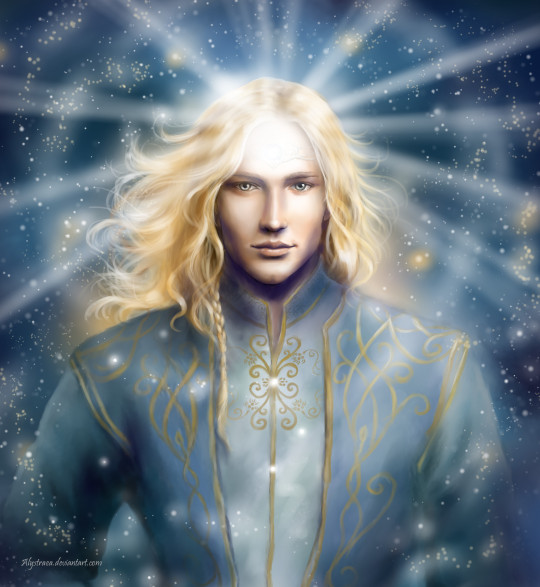
Eärendil, aka Gil-Estel the Star of High Hope, aka Ardamírë the Jewel of the World.
#earendil#the blessed#gil-estel#ardamire#the splendor of the children of the earth#the herald of the morning#the bright star of morning and eventide#love how extra his titles are#silmarillion#tolkien#fan art#my art
515 notes
·
View notes
Text
Closed Starter
For the attention of Elrond Peredhel.
I am uncertain if you wish to hear from me, but I cannot be certain that you do not either. This was the only comprimise I could think of, that both allowed for you to have some say, but did not risk allowing you to think we did not care.
We - Elwing and I - were informed that you departed Middle Earth a short while ago. If the distance is still the same, this letter should arrive at the home of your wife only a little before you arrive. Hopefully, after she has left to join you.
If you wish to speak with me, I will be at the Green Crab Tavern in Avallónë during normal opening hours for the next three months, but for every third day, from the date of this letter. A map is included. Should this be inconvenient to you, or too soon, my usual address is on the reverse of this letter. You may use it as you wish, though if you choose to journey in person be wary of the winds. They are treacherous this far north.
I am not sure what else one says in a letter such as this. I was never best suited to these things - neither of us were - and I neither wish to say something which would hurt you, nor leave out something the absence of which would do the same. Certainly I have hurt you in ways I never wished to before, and that always precludes doing so again. I would think it is acceptable to say I am proud of you - even if only a third of what we are told is true? For most surely I would be and am.
May the world be kinder to you with each passing day,
Eärendil Ardamírë
* * *
It was the eighth or ninth draft of the letter, and Eärendil still was unhappy with it. None the less, he had run out of time; he folded it carefully into a neat envelope, and sealed it with black wax and the symbol of his House. The messanger tasked with delivering it set off as soon as the letter was in hand, as Eärendil himself left in the opposite direction.
A room had already been booked at the tavern of his mother’s recommendation; it was only a matter of arriving in time to claim it, and of waiting to see what would happen.
@edhelquendi
10 notes
·
View notes
Text
Eärendil had this name as father-name, and as mother-name he was called Ardamírë. In this case both names were ‘prophetic’. Tuor in his long journey by the west shores of Beleriand, after his escape from captivity, had been visited by the great Vala Ulmo in person, and Ulmo had directed him to seek for Gondolin, foretelling that if he found it he would there beget a son ever afterwards renowned as a mariner. Improbable as this seemed to Tuor, since neither the Atani nor the Noldor had any love of the sea or of ships, he named his son in Quenya ‘sea-lover’. More purely prophetic was the name Ardamírë ‘Jewel of the World’; for Itarildë could not foresee in her waking mind the strange fate that brought at last the Silmaril into the possession of Eärendil, and enabled his ship to pass through all the shadows and perils by which Aman was at that time defended from any approach from Middle-earth.
— The Peoples of Middle-earth, “The Shibboleth of Fëanor”
wait did Ulmo really tell Tuor to name his bb Earendil @echoofthemusic ...it's past two in the morning here, am insomnia posting lol
fucked up if tru. He's like oh btw call your baby 'the messiah' Earendil so when i rapture his wi- I mean when i let him into heave-- i mean when with the aid of the silmaril he ends up in Valinor he'll nicely fit into the prophecy Namo made several Ages before...thank you.
9 notes
·
View notes